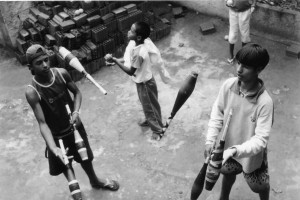By Kyle Petersen
Under even the best of circumstances, street performing is a challenging way to make a living. Performers have to carry heavy props to locations across metropolitan areas, and require hours of practice to develop a well-honed routine. Performers also must contend with a myriad of distractions; extreme sun, sudden wind and rain, emergency sirens and competing street performers can all ruin a show and cost performers money. Street performers in the United States and Europe, however, benefit from high-traffic tourist areas in many cities where foreigners with deep pockets are all too glad to hand over a couple of dollars in exchange for a few tricks and a smile.
The same cannot be said for street jugglers throughout the third world. With fewer tourist areas and higher jobless rates, street performers in developing countries often face cut-throat competition for meager pay. While there are many well-polished variety artists in the third world, jugglers in countries like Brazil and Mexico must also compete with young upstarts who learn a three-ball cascade and quickly hit the streets in an effort to make a quick buck.
Because many cities in the developing world lack open public spaces, street jugglers often perform at traffic lights. A recent article by Reuters describes the experiences of Fabiano Cordeiro, a 26-year-old juggler and unicyclist living in Sao Paulo, Brazil:
In front of halted traffic, Cordeiro stays in one spot and whirls his burning torches in perfect circles in the dark. Then he leaps off the cycle in time to run between the lines of vehicles with his outstretched hat.
Some drivers reach for their small change. Others stare intently ahead, ignoring the wiry juggler in a striped T-shirt, shorts and black braces.
“I was once given 50 reais ($28.34) in Brasilia,” he said with a grin at the memory, “but 2 reais is more common.”
Life on the streets in Latin America can be extremely perilous. Street performers not only have to contend with dangerous traffic under stoplights but they also are easy targets for robbers because they live on the streets and they carry cash. Guillermo de la Kausa, a street performer and artist who videos and photographs other street performers he encounters, explains via email (translated from Spanish):
I am in the street juggling, I live off the coins that they give me at the traffic light and this is how I pay for my food and my hotel. On the street, you are exposed to many dangers. They robbed me of my belongings and I lost my video camera and because of that I can no longer record [the street performers I encounter].
To experience Latin American street performing first hand, watch as a Peruvian man juggles knives on his tall unicycle as oncoming traffic whizzes by (video courtesy of Arte Callejero Sin Fronteras):
Jugglers Daniel Valderrama Gallego and Gabriel Gomez show off their skills in locations throughout the Colombian capitol of Bogota:
Do you have any experiences with street performing in Latin America? Please feel free to contact us via Facebook, Twitter, or by posting a comment below.








